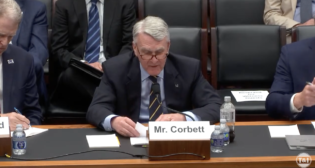
PEB issues recommendations in NJT labor dispute
Written by William C. Vantuono, Editor-in-ChiefPresidential Emergency Board (PEB) 248 has issued recommendations to settle a contract dispute between New Jersey Transit and the Rail Labor Coalition of 14 unions representing 4,300 union workers that has dragged on for four years, with no end in sight and the looming possibility of a strike or lockout.
The PEB found the Coalition proposals on wages and health insurance contributions “appropriately based on settlements in the commuter industry,” a Coalition spokesperson said. “The PEB, composed of three veteran, distinguished neutrals, has proposed terms that represent a reasonable compromise approach to settlement. We sincerely hope that NJ Transit will now take this opportunity to bring this protracted dispute to an end.”
The PEB’s recommendations are non-binding and the parties have 120 days to reach agreement based on the recommendations.
PEB 248 recommended wage increases totaling 18.4% in compounded wage increases over 6.5 years, or 2.6% per year. With increases for health insurance factored in, the recommendations totaled 17.7% over the term, or 2.5% per year.
“Over the years, wage settlements at NJ Transit have closely followed the general trend of wage changes at the other large commuter railroads in the region, including the Long Island Rail Road, Metro-North Railroad, SEPTA (Southeastern Pennsylvania Transportation Authority) and MBTA (Massachusetts Bay Transportation Authority),” said the Coalition. “The PEB’s recommendations are consistent with the average annual uncompounded wage increases at the four other large commuter rail carriers. The average annual wage increases of all four of these commuter railroads is 2.6%, the same nominal wage rate increase recommended by the PEB.”
Although PEB 248 recommended an increase in health insurance contributions and an increase in co-payments, it rejected NJ Transit’s proposal for a new insurance plan that would make employees responsible for 50%of excise taxes incurred as a result of the Affordable Care Act. “The carrier’s proposal falls outside the current health insurance contribution trends in the industry,” PEB 248 stated. “Our recommendation would [raise] employee contributions from 1.8% to 2.5%, which we do not consider an unwarranted increase.”
The PEB also rejected NJ Transit’s proposal to eliminate employee ridership passes, a move reportedly demanded by New Jersey Governor Chris Christie, who frequently attempts to exercise control over NJ Transit affairs, according to an industry observer. The PEB also rejected NJ Transit’s proposal to reduce contributions to new-hire 401 (a) contributions and also recommended provisions for conductor certification pay.
The Coalition and NJ Transit have until Nov. 12, 2015 to negotiate a voluntary agreement. If no agreement is reached by that time, either side or the President can invoke a second PEB. That PEB will select what it believes is “the most reasonable final offer.” Its recommendation again will be non-binding. The parties will then have until March 11, 2016, to reach a voluntary agreement. If no agreement is reached a strike or lockout could occur.
PEB 248 is chaired by veteran labor arbitrator Dr. Elizabeth C. Wesman, who is joined by arbitrator Barbara Deinhardt and attorney Ann Kenis. Weiman has taught at various upstate New York universities, while Deinhardt was a professor in New York City. Kenis, a Chicagoan, worked for several unions there, among other positions.



